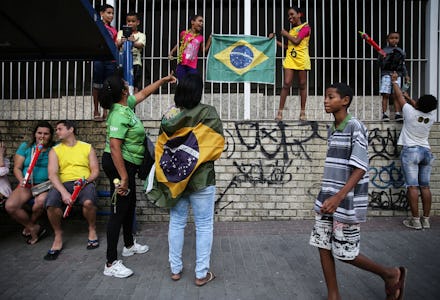Poverty in Rio: Why Brazilians can't afford tickets to their own Olympic Games

While there are certainly good reasons to be excited about the upcoming 2016 Summer Olympics in Rio de Janeiro, Brazil, one group has been less enthusiastic about the games: actual Brazilians.
Their reasons are complex, and residents say preparations for the Olympics have been a missed opportunity to reduce violence and elevate the poor. In fact, there's evidence poverty and disorder are actually on the rise because of the games.
But perhaps the most notable fact, illustrating the uncomfortable paradox of hosting the Olympics in a developing country, is that many Brazilians can't even afford tickets to the events. In 2014, Rio's mayor promised to give away 1.2 million tickets for free to students and the poor: To date, the city has set aside 47,000 tickets — only 4% of his promise.
The problems don't end there.
"I see the millions and billions spent on overpriced Olympics construction, which should be spent on education, health and projects for people," Lucas Rodrigues Alves, a university student in Rio, wrote in a letter to the Guardian.
That sentiment is shared by many others in the nation: One recent survey from polling firm Datafolha found that half of Brazilians were opposed to hosting the games, and 63% of them think the costs of hosting — such as the massive wave of evictions from Brazil's "favelas" or shantytowns — outweigh the benefits.
Another awful fact? Many Brazilians who actually built the Olympic facilities don't have enough money to attend any the events.
"I can't afford tickets for the Olympics because they are too expensive for me," construction worker Dennis Claudinho told Reuters.
Brazilians are also frustrated about the amount of money being spent on the games while important city services are being neglected, as the country grapples with a terrible recession. Millions of Brazilians have lost their jobs, and a new austerity program has led to drastic cuts to government services in education and healthcare.
From Alves's letter:
I see the millions and billions spent on overpriced Olympics construction, which should be spent on education, health and projects for people of the favelas to have opportunities to grow and participate in the development of the whole city. Rio does not need the Olympics. We need basic things that, unfortunately, are not in the interests of the politicians, who live in Leblon and Ipanema, facing the beach.
The Olympics were supposed to help re-make Rio de Janeiro, revitalize its infrastructure, and help market the city as a global center of tourism. Many credit the Olympics with turning Seoul, South Korea, into a powerhouse of tourism and commerce, for example.
But most improvements to Rio infrastructure have been restricted to a wealthy suburb, Barra da Tijuca, and many of the new facilities, such as the Olympic Village, are slated to be converted into luxury housing.
To some extent, the prospects for other developing nations looking to host the Olympics rest on Brazil's shoulders. The Rio Olympics will serve as a test as the International Olympic Committee considers countries in Africa as hosts for future games, IOC official Gerhard Heiberg told the Wall Street Journal.
"We need some assurance it will be a success," he said.
There are already signs that the Rio games will be unable to deliver the promised tourism bump: Only 79% of the tickets have been sold, compared to more than 95% for the last two games in Beijing and London.
Read more: